In the first episode of Rev. Dr. F. Willis Johnson’s podcast, Collage, Johnson discusses the promise of Black History Month.
Podcast: Collage: The promise of Black History Month
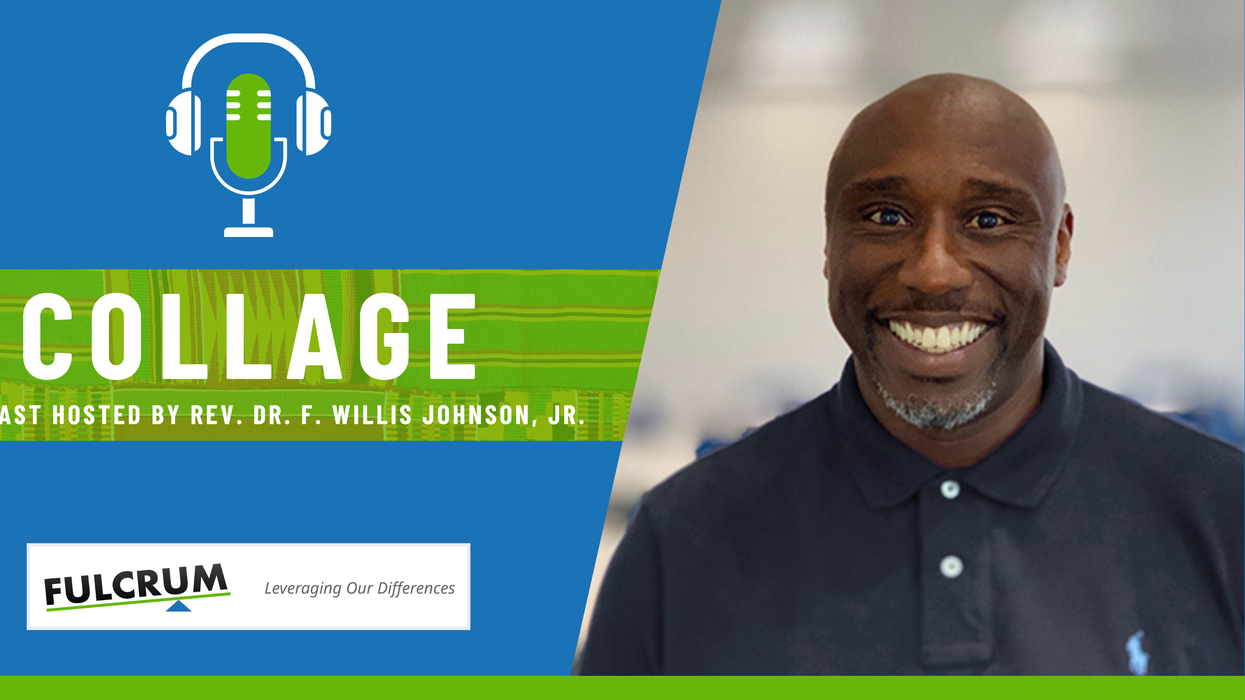

In the first episode of Rev. Dr. F. Willis Johnson’s podcast, Collage, Johnson discusses the promise of Black History Month.

I know so many people are approaching America’s 250th anniversary with a sense of trepidation, even dread. Is there really anything to celebrate given the recent chaos and uncertainty we’ve been experiencing? Is productively reckoning with our history a possibility these days? And how hopeful will we allow ourselves to be about the future of the nation, its ideals, and our sense of belonging to something larger than ourselves?
Amid the chaos and uncertainty of 2026, I find myself returning to the words of the writer and civil rights activist James Baldwin. Just as things looked darkest to Baldwin amid the struggle for civil rights, he refused to give up or submit or wallow in despair.
Instead, he wrote: “Not everything is lost. Responsibility cannot be lost; it can only be abdicated. If one refuses abdication, one begins again.”
This is the task before us today. To “begin again”—as individuals, as communities, as a nation. Today, we must begin the next 250 years. The good news is that people across our country are open, willing—and ready.
As I’ve crisscrossed our nation the past two years on a series of civic campaigns, I have witnessed a growing energy and hunger among Americans to rally around a new moral vision for our communities and society. This new moral vision includes:
The loudest voices would have us believe such a vision doesn’t exist and won’t anytime soon. They seek to win for their side at any cost. Even people of goodwill say a new moral vision is just a utopian idea, given the state of the country. But neither division nor despair will enable us to seize the next 250 years, or even make tomorrow better.
What’s more, this new moral vision is rooted in reality. Indeed, it emerged from my deep engagement with Americans over many years—across all types of communities and all political persuasions. I am convinced it holds the power to galvanize enough of us to “begin again.” It can help us engender a sense of belief that we can get things done together. And it offers us the opportunity to make pragmatic down payments toward moving this country forward.
Numerous communities are already rallying around this vision and making it real, including some you may least expect. Take Union and Logan Counties in Ohio. They’re in Jim Jordan’s congressional district, the co-founder of the House Freedom Caucus.
In each community, leaders and residents have come together over the past two years to create deep, lasting change on youth opportunities, senior care, homelessness, healthcare, and other issues. Importantly, they are working in ways that revive the civic culture of these communities by engaging people authentically, getting leaders and organizations to work together in new ways, creating stronger norms of interaction, establishing a stronger sense of shared purpose, and ultimately taking action on what matters to people.
Their efforts bring people together across political parties, race and ethnicity, socioeconomic status, and other identity markers that so often drive us apart.
This new moral vision is also being brought about in Alamance County, NC, likely the most divided place I have worked with in 40 years. And it is coming alive in Reading, PA, about a decade ago, declared the poorest community in America, which was once predominantly White and is now 70% Latino.
All across these United States, people are choosing hope over despair, healing over trauma, and progress over division. People are finding ways to reckon with our history while celebrating what makes America good.
We need to build on this by rallying more Americans to a new moral vision that helps us “begin again.” In doing so, we can forge a more promising start to our next 250 years.
Rich Harwood is the president and founder of The Harwood Institute.
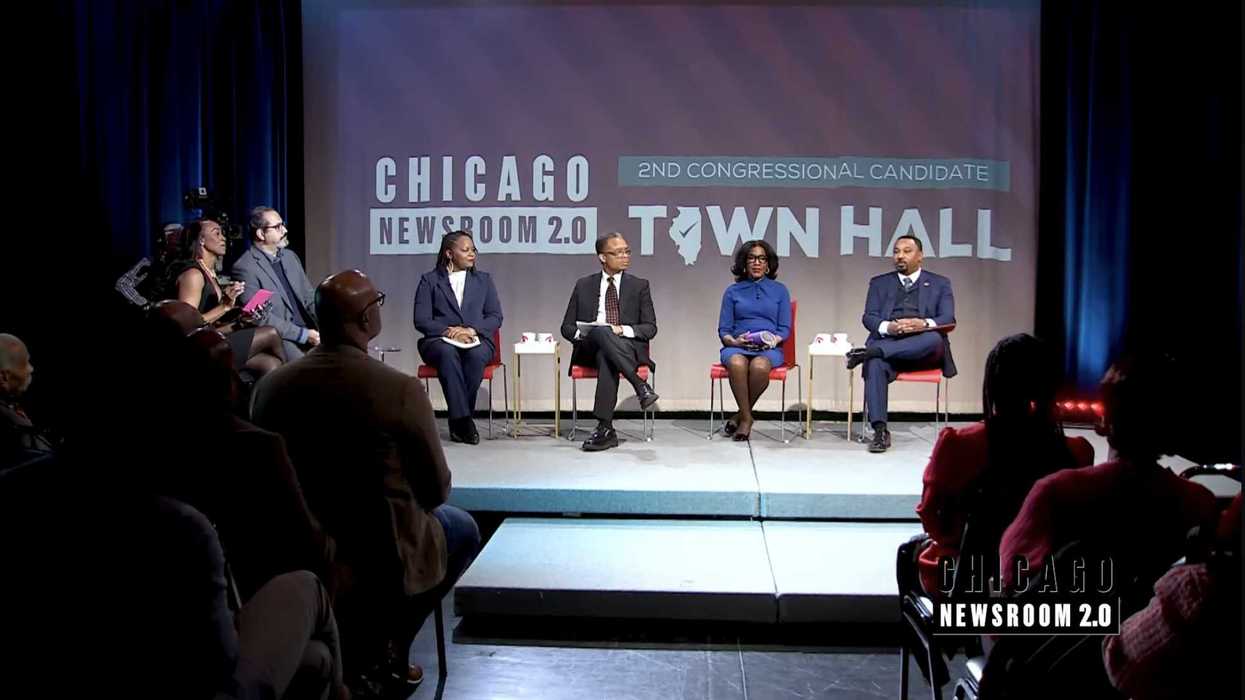
Leading Democratic contenders for Illinois’ 2nd Congressional District gathered Thursday, February 12, for a televised town hall on the Chicago Access Television Network (CAN-TV)
Several of the leading Democratic contenders for Illinois’ 2nd Congressional District gathered Thursday, February 12, for a televised town hall on the Chicago Access Television Network (CAN-TV), offering voters a rare opportunity to hear their priorities side by side as the competitive primary enters its final month. The forum was moderated by The Fulcrum's executive editor and Latino News Network's publisher Hugo Balta and public health and emergency management expert Dr. Suzet McKinney, who pressed the candidates on the district’s most urgent needs and the kind of leadership they believe residents deserve.
Former Congressman Jesse Jackson Jr., Cook County Commissioner Donna Miller, State Sen. Willie Preston, and Metropolitan Water Reclamation District Commissioner Yumeka Brown took part in the discussion. State Sen. Robert Peters, another top contender, was scheduled to appear but excused himself due to being taken ill.
- YouTube youtu.be
The race has drawn heightened attention because the seat is open for the first time in more than a decade. The vacancy was created when U.S. Rep. Robin Kelly announced she would not seek reelection and would instead run for the U.S. Senate, prompting a crowded Democratic primary in a district where the nominee is expected to be the overwhelming favorite in November.
After candidate introductions, Dr. McKinney opened the evening by asking all candidates, “What do you believe the 2nd District needs from its next representative that may not be getting today?”
Donna Miller was the first to respond:
"I think that what we all need in this country is diplomacy. We all need to be not looking to fight. We need to be coming together. I look at leadership as a choice you make in your life to make sure that you're bringing value, ethics, and transparency to government. And that's what I would bring to the 2nd congressional district."
McKinney followed with tailored questions that pushed each contender to connect their experience to the district’s needs. To Jackson, she posed, “What would you do differently now that you did not — or could not — do during your previous service as Congressman?”
Jesse Jackson Jr. responded:
"What's really clear to me is that the district needs to be connected to the global economy. The Bishop Ford Freeway at eight in the morning, going north, is in a traffic jam, so is I-57. No one in Chicago or in the region is fighting to get to the South Side of Chicago and south suburbs. The next representative of the 2nd congressional district really has to find a way to alter traffic. To bring jobs to the South Side of Chicago and south suburbs. To connect the district to the global economy so that we can sustain ourselves."
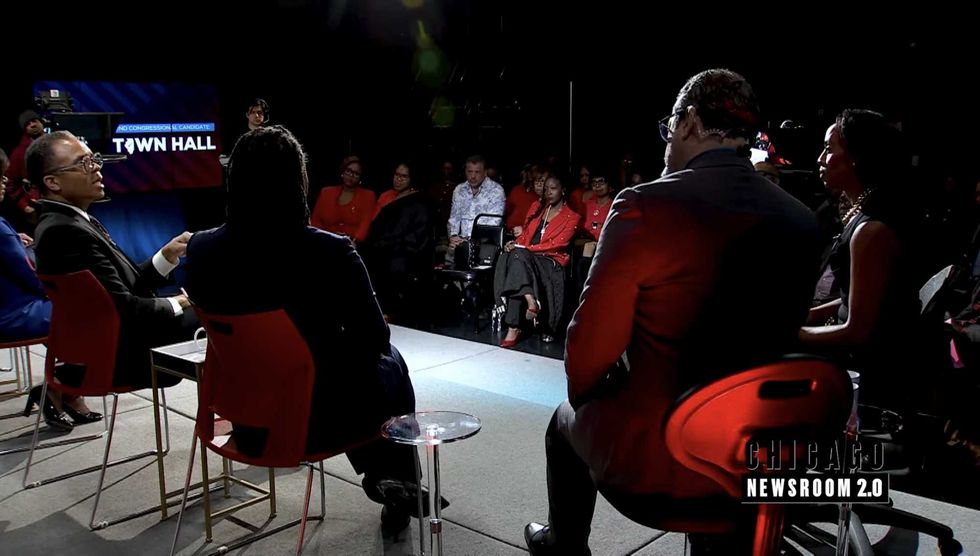
Balta’s questions included the economy, poverty, and basic needs—issues that have long shaped life in the 2nd District. He asked the candidates, “The racial wealth gap remains wide in Illinois. What specific policies would you support to help families build wealth — not just income — through homeownership, savings, or retirement security?”
Yumeka Brown had this to say:
"As a resident of the Southland of Chicago, I have seen a major hit in property taxes, which has caused a lot of businesses not to want to come to the south suburban communities that are east of Harlem. I will bring federal dollars back to those communities to help support small businesses. I think that that is critical."
Balta then pressed the group on child well‑being, asking, “Child poverty has lifelong consequences for education, health, and earnings. What federal policies would you prioritize to reduce child poverty in this district?”
Willie Preston said:
"Some people in this nation had a 400-year start. It is not a surprise that they have greater wealth. We have to champion reparations. Every child in this nation should have a CD (certificate of deposit) put into their name. And we should be able to let that grow, and then when they're of age, turn that over."
Throughout the evening, candidates offered sharply distinct visions. Jackson emphasized economic revitalization and infrastructure investment. Miller focused on her experience managing county budgets equips her to negotiate at the federal level. Preston highlighted workforce development and the expansion of trade schools. Brown centered her message, calling for long‑term investment in community well‑being.
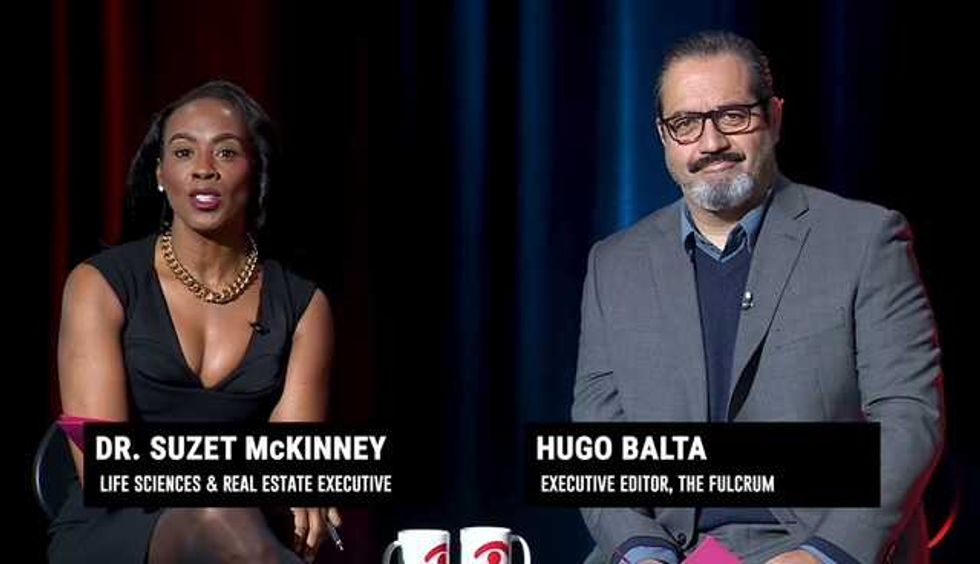
Reflecting on the significance of the event, Balta said, “Town halls like this give voters something they rarely get in a crowded primary: a chance to hear candidates engage directly with the issues that shape their daily lives. When people can compare visions in real time, they’re better equipped to choose the leader who truly understands their community.”
Ten Democrats are on the ballot overall, including Adal Regis, Eric France, Patrick “PJK” Keating, Sidney Moore, and Toni C. Brown. Republican Mike Noack is running unopposed in his party’s primary.
CAN-TV also hosted a Town Hall with the leading contenders in the 9th Congressional District. You can watch that debate by clicking Here.
Darrious Hilmon, Executive Editor at CAN‑TV, underscored the network’s mission, saying, "CAN TV's broadcast of the 2nd and 9th Congressional Towns are proof-points of our unwavering commitment to civic engagement, voter education, and ensuring that our communities have direct access to the information they need to participate fully in our democracy."
Illinois 2nd District Candidates Meet in High‑Impact CAN‑TV Town Hall Ahead of 2026 Primary was first published by the Latino News Network and was republished with permission.
Hugo Balta is the executive editor of The Fulcrum and the publisher of the Latino News Network. He is often a guest and guest host of Chicago Newsroom 2.0 on CAN-TV.
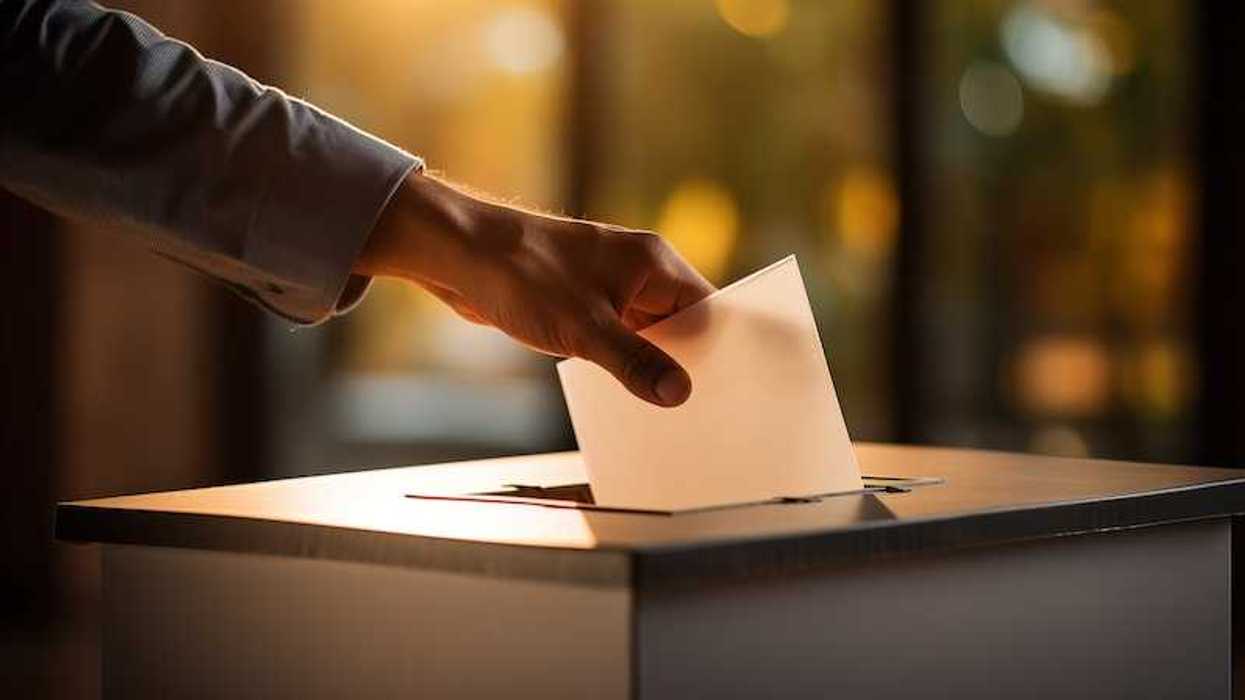
As of April 2025, people convicted of a felony in Maine, Vermont, and Washington, D.C. retained the right to vote while incarcerated, according to Ballotpedia.
Kentucky has barred more than 158,000 of its residents from voting.
Most have previous felony convictions and despite a 2019 executive order by Gov. Andy Beshear restoring the voting rights of some Kentuckians with past felonies, the Commonwealth still denies the right to vote to more prior felons than nearly any other state.
Debra Graner, a voting rights advocate for Kentuckians for the Commonwealth and the Kentucky League of Women Voters, said people reentering society have done their time and should be allowed to participate in civic life.
"This is about second chances and trying to feel whole and be a good citizen again," Graner stressed. "Voting is one of our rights. To disenfranchise people, it’s just a hurtful thing."
Some Kentucky lawmakers have said they will sponsor 2026 legislation to put a constitutional amendment on the ballot and let voters decide if voting rights should be restored to people with certain felony convictions. The state’s voting ban for people on felony probation or parole, as well as for people who have completed their sentence, is driving up the state’s disenfranchisement numbers, according to the Sentencing Project.
Although Graner supports putting the issue to a vote via constitutional amendment, she is worried the public may not understand how deeply disenfranchisement affects communities.
"A lot of people are going to automatically go, 'No, why would I want a criminal to vote?'" Graner acknowledged. "That's the big thrust for me, is getting the public to understand the situation that we're in."
Residents with previous felony convictions who have questions about their voting status can visit CivilRightsRestoration.KY.gov for information on whether they can still vote.
KY advocates continue to push for felony voting rights restoration was first published on Public News Service and was republished with permission.
Nadia Ramlagan is a producer with Public News Service. She covers the Ohio Valley and Appalachian region for Public News Service (Kentucky, Ohio, West Virginia).
Things rarely change unless there is a crisis. The present administration has certainly precipitated unprecedented challenges at all levels of our government. With the likelihood that the crisis will only deepen, the more pertinent question is how far will the destruction go?
A society’s capacity for change is often proportionate to the disaster’s depth. From the ashes of the Civil War, the ratification of the 13th, 14th, and 15th Amendments would go on to play such an important role in the American polity that their passage is considered by some to be a “Second Founding” of American democracy. Amidst the backdrop of decades of political decay and voter cynicism due to gerrymandering, inequities in voter representation, and political gridlock, we do not have the luxury of hoping after the current administration that “things will go back to normal.” Depending on the scale of the mounting assaults challenging our Constitutional system—made even more dire with concerns that future elections may be disrupted or manipulated—we must be prepared to harness a potential groundswell to pass reforms that update our democracy in the most concrete and durable ways.
Three ambitious proposals must be prioritized to structurally strengthen the American people’s connection to the national government, thereby helping redefine the role of the American citizen and securing the vibrancy of our nation’s democracy for generations to come.
I. Expanding the House of Representatives
Designed to be the governmental body with the most direct connection to the average American, the House of Representatives grew along with the early republic, reaching its final size of 435 members in 1911. Since then, the average population per Congressional district has ballooned to comical levels, reaching an average of 760,000 people per representative.
Expanding the House—specifically through the Wyoming Rule, which pegs district size to the least-populous state/district—would increase the chamber to approximately 574 members, an addition of 139 members. This structural update would generate a domino effect that addresses disparities in voter representation, gerrymandering, and Congressional stagnation.
The current cap causes massive “rounding errors” that deepen voter inequity. For example, Idaho has two House seats for a population of 1.84 million, meaning each representative serves about 920,000 people. In contrast, Wyoming’s lone House Representative represents 580,000 people, diluting the voice of Idaho voters. By raising the cap, these rounding errors in district partitioning could be corrected, bringing far more equitable voter representation in Congress.
Gerrymandering relies on the principles of packing (reducing the power of the opposition’s voters by compacting them into a single seat) and cracking (spreading the opposition's voters so thinly across districts that they cannot win). Smaller districts make both strategies riskier; packing becomes harder because opposition voters are forced to spill into other districts, making them more competitive, and cracking becomes more perilous as safety margins within districts shrink.
Often cited as a deterrent to expanding the House of Representatives, an increase in the 435-member cap will require greater investment in facilities, staff, and other structural aspects of the people’s chamber. For a chamber that has been so impotent and moribund during the current Presidential administration, any change should be welcomed at this point. The past few decades have seen a hollowing out of Congress's administrative manpower. Expanding the House of Representatives will inject much-needed energy into Congress.
II. Proportionality in Presidential Elections
Originally conceived as a layer of protection against demagoguery, the Electoral College now simply obfuscates the value of individual votes. The malapportionment of districts under the current Congressional apportionment formula means that voters in certain states, such as California and Texas, are significantly underrepresented. Lastly, the winner-takes-all system generates distortions that completely silence minority voters and artificially funnel all electoral efforts into a few battleground states.
Two distinct paths could alleviate these distortions.
The more conservative route is to couple the expansion of the House of Representatives with proportional voting systems for each state whereby a state’s electoral votes are divvied up based on the voter percentages within the state. These reforms would produce a far more representative picture of the American electorate by reducing representation gaps and giving minority voters a voice. An important consideration is that proportional voting would allow third-party candidates to win electoral votes, empowering alternative parties that could change the political landscape.
The national popular vote is the more radical choice. While a Constitutional amendment would be the traditional path, the National Popular Vote Interstate Compact—an agreement among states to award their electors to the popular vote winner—offers a theoretical legal bypass. The beauty and durability of the popular vote is the purity that every person’s vote is completely equal in value. All such distortions caused by the Electoral College would vanish in an instant. Though a steep uphill climb, there is clear precedent for change—the 17th Amendment, ratified in 1913, established direct election of senators.
III. A “Rigorous Flexibility” Model for New Amendments
To truly reconnect citizens to the Constitution, we must break the bottleneck of Article V, and what better way to make citizens feel connected to the Constitution than the knowledge that they can play a direct role in shaping it? Previous calls for citizen involvement in the amendment-making process exist, with Senator Robert La Follette advocating for direct democracy in the ratification of new amendments during the early twentieth century.
I propose a “Rigorous Flexibility” model. For a new amendment to be ratified, it must fulfill two out of three paths:
This two-out-of-three system draws on the principle of “double security” envisioned by Alexander Hamilton and James Madison in the Federalist Papers, in which, when the people need aid, they can pursue alternate paths for support at either the state or national levels. This proposal incorporates direct democracy, maintains the high bar for constitutional change, and prevents a single political machine operating at the national or state legislative levels from permanently blocking progress. The result is that the Constitution will become a more responsive document.
While ambitious, passage of these major structural reforms would foster a deeper connection between the American people and the national government—increasing their stake in the American experiment and helping to usher in a more sustainable democracy.
Jeremy Chang is a physician-scientist at the Tri-Institutional MD-PhD Program in New York City, earning his PhD from Rockefeller University. He spends his time studying the microscopic systems of DNA damage and pondering the macroscopic systems of American government. He completed his undergraduate studies at the University of Chicago.